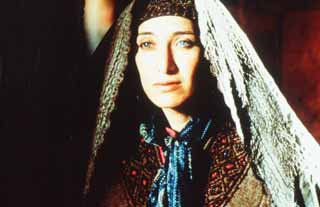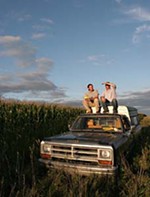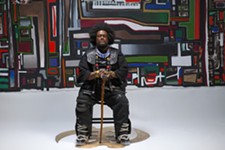
Kandahar
2001, NR, 85 min. Directed by Mohsen Makhmalbaf. Starring Nelofer Pazira, Sadou Teymouri, Hassan Tantaï.
REVIEWED By Marrit Ingman, Fri., March 1, 2002
It goes without saying that this exquisite film, which premiered at Cannes in May 2001 amid much acclaim, has become even more resonant for audiences since the aftermath of September 11, which focused attention, belatedly, upon the Afghan people. Secretly filmed in a refugee settlement in southern Afghanistan, Kandahar was meant to be a clarion bell for the rest of the world, depicting the little-seen conditions of daily life after years of war and Taliban rule. Now, though the film's political context has changed, its power as a cinematic document is undiminished. As is typical of the films of Iran (writer-director Mahkmalbaf is based in Tehran, as is his wife, filmmaker Marzieh Meshkini), the story is simple and true-to-life, and the technique is naturalistic, using nonprofessional actors, photography that emphasizes the characters' environment, and deliberate narrative pacing that mimics real-time events. Nafas (Pazira) is a journalist Westernized after her family's immigration to Canada. She returns to her homeland after receiving a letter in which a childhood friend threatens suicide at the beginning of an upcoming eclipse. With only a few days to spare, Nafas sneaks into the country at its southern border and begins making her way to Kandahar, veiled in a burqa and constantly subject to the vagaries of fortune. Along the way, she encounters a family of refugees returning from Iran, a fast-talking pre-teen huckster (Teymouri), an American expatriate (Tantaï) searching for God, a school for mujahideen, and the harried doctors at a Red Cross outpost. The film's events unwind slowly; like the neorealists, Makhmalbaf realistically underscores the oppressive frustration of Nafas' predicament rather than attempting the clock-ticking suspense common to the Hollywood imagination. The danger of her journey is never in question, but danger is mundane in Afghanistan -- where, a character points out, "weapons are the only modern thing," land mines are hidden in toy dolls, and the drinking water can be fatal. It's unfortunate that the Iranian cinema has never gained a toehold beyond the arthouse in the U.S. -- in fact, it's become a joke for urban critics to champion it vigorously to little avail -- but this is how the story of Afghanistan should be told: by the region's people. Mainstream audiences should hear it but won't. Moreover, Kandahar is simply a beautiful movie, made not only with activist intentions but cinematic refinement. The painterly landscape photography is marked by stunning, almost surreal images that linger in the mind. A crowd of shapes materializes on the horizon as a helicopter approaches, and a slow zoom reveals that they are maimed men with crutches, hurtling desperately toward a sign of aid. In a single static shot, a parachute drifts downward, a pair of disembodied legs -- prosthetics, we realize -- dangling beneath. A hand, furtively painted with vibrant green nail polish in a bazaar, is as shriveled as an old woman's but belongs to a child. These images convey the horrors of life in a country long devastated by war, drought, and intertribal conflict, as well as its absurdity.
A note to readers: Bold and uncensored, The Austin Chronicle has been Austin’s independent news source for over 40 years, expressing the community’s political and environmental concerns and supporting its active cultural scene. Now more than ever, we need your support to continue supplying Austin with independent, free press. If real news is important to you, please consider making a donation of $5, $10 or whatever you can afford, to help keep our journalism on stands.
Nov. 9, 2007
Kandahar, Mohsen Makhmalbaf, Nelofer Pazira, Sadou Teymouri, Hassan Tantaï







